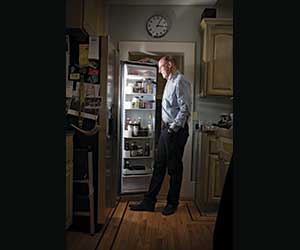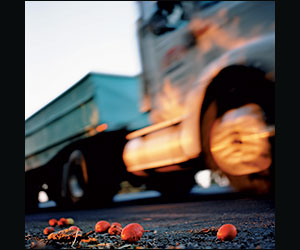On a rainy Tuesday night in February, a Berkeley journalism professor wondered aloud before a full house at the campus’s largest auditorium, “Why did over 2,000 people pay to hear a reporter and a grocer speak?” The reporter and professor was Michael Pollan, author of the bestselling agricultural exposé The Omnivore’s Dilemma. The “grocer” was John Mackey, who is also the founder and CEO of organic powerhouse Whole Foods Market.
The two men have become catalyzing figures in the growing backlash against industrial agriculture. Yet they have had some sharp words for each other since Pollan’s book was released last spring, featuring a biting critique of Whole Foods’ “big organic” business model. It was the first major jab at the store, which had, until then, enjoyed the adoration of affluent consumers and journalists alike. In the months that followed, Mackey said, “It became open season on Whole Foods.” On more than one occasion (including in this publication), Whole Foods was called the Wal-Mart of organics.
The event last Tuesday was Mackey’s official retort to Pollan’s book. Mackey was to speak for 45 minutes, followed by a debate between him and Pollan, after which the two would take questions from the audience.
Although the two seemed to have worked out their bitterest disagreements in a now-public email exchange, the evening did clarify a few things in the muddled debate surrounding local, organic, and beyond organic foods.
1. Whole Foods has changed since Pollan’s book came out. Pollan has one main beef with the retailer: It buys from big industrial organic producers. The practice has several distasteful consequences. Large organic feedlots are hardly more committed to animal welfare than their conventional counterparts. But in 2003, Whole Foods announced that it would buy only from producers who could demonstrate humane treatment of the animals they raise. And Mackey told the Berkeley audience last Tuesday that the company was in the process of developing a 5-star rating system for animal welfare, which it would work to put in wider (nonproprietary) use.
Buying from big producers also means that Whole Foods doesn’t throw its full weight behind small family farms. But Mackey claimed that the company buys just 22 percent of its produce from large corporate farms. He also claimed, in one of several challenges to the distinctions Pollan draws between good guys and bad guys, that “It’s not necessarily the case that large organic farms can’t be ecologically sustainable.”
Big producers also tend to squeeze out local producers. Tales of organic produce in Whole Foods coming from as far away as Chile and China circulated in the media’s spring/summer feeding frenzy on Whole Foods. Mackey said that in 2006, 16 percent of the grocer’s produce was local, but that the 2007 target is 20 percent and will go up from there.
2. Mackey did not, however, emerge as a big believer in local food. He reminded the audience that local food “is not necessarily organic, and not necessarily humane.” He also explained that when Whole Foods opened in Austin, Tex., in 1980, there was little local organic produce to be had. Mackey claimed that buying food from developing countries helps them emerge from poverty—and would do so more effectively if the United States and other affluent nations would get rid of their fat agricultural subsidies. (The latter part earned him a “here, here” from Pollan, a staunch critic of corn subsidies.) He went on to say that food miles—how far your food travels from farm to table—are not as big an issue as Pollan and local food advocates have claimed. He said transportation accounts for just 10 percent of the amount of fossil fuel used in putting food on consumers’ tables. In fact, he said, the heaviest use of fossil fuel occurs during processing and consumer storage and preparation—aspects that are often left out of analyses critical of industrial agriculture.
3. Elitism remains a real problem in the foods movement. When Pollan asked Mackey to address the charge that Whole Foods, like other organic and beyond organic retailers, outprices average Americans (thereby earning it the nickname “Whole Paycheck”), Mackey replied, to hisses from the Berkeley audience, “Our culture is continuing to get wealthy—more and more people are entering into higher income levels.” In fact, the nation’s overall wealth has increased, but more and more of it rests in the hands of fewer and fewer people. Mackey pointed to the discrepancy between the percentage of disposable income that Americans and Europeans spend on food: 8 and 15, respectively. “If we ate only organic,” he said, “we’d be right where Europe is.”
The audience may have been displeased, but Pollan by and large seems to agree with Mackey about prices. In The Omnivore’s Dilemma, he writes that, “If the high price of my all-organic meal is weighed against the comparatively low price it exacted from the larger world, as it should be, it begins to look, at least in karmic terms, like a real bargain.” Perhaps, but when pennies are precious it’s hard for consumers to think so abstractly or to put others’ interests before their own.
4. Whole Foods isn’t perfect, but comparisons to Wal-Mart are off-base. Whole Foods and Wal-Mart share a hostility to unions, but that merely puts both in the mainstream. And Tuesday night, Mackey announced several new Whole Foods initiatives that scarcely resemble Wal-Mart’s profit-only business model. They include a $30 million venture capital fund to invest in “food artisans” producing traditional foods; a new Whole Trade Guarantee that will encompass fair trade prices, humane labor practices, and sustainability; and a move toward even stricter animal welfare standards. (Mackey also stated for the record that he had “lost the vote” in the company’s recent decision to grant an exception to its no live-lobster policy to its Portland, Maine, store.) Pollan was persuaded, he wrote in an email after the debate, that “Mackey is genuinely interested in pushing Whole Foods to do better,” though he wondered if the company “will be able to live up” to its commitments.
5. Michael Pollan loves the limelight. His “I’m just a reporter” schtick notwithstanding, Pollan in the spotlight looked suspiciously like a cat in the sun. Pollan has gone from being an observer to being a player in the food debate. The writer hoped aloud that his book had “played some small part in several new Whole Foods initiatives having to do with local food and livestock” that Mackey introduced that night—and, indeed, it appeared to. Pollan also asked Mackey if he blamed the book for the precipitous drop in Whole Food’s stock price over the last year. Mackey first joked, “You probably cost us about $2 billion,” but then answered more seriously that, before the media—starting with Pollan—attacked Whole Foods, it had lionized the company, contributing to a potential overvaluation of its stock.
Pollan may have worked out his main disputes with Mackey, but the audience hadn’t, as its call-and-response style participation revealed. Despite the crowd’s obvious desire to participate, Pollan moderated exactly one tough question from the audience before returning to his own line of questioning.
In a sense, Pollan’s move epitomizes the food debate: It’s fascinating and personal, but can all too easily become a gentleman’s debate that shuts out average Americans. The debate will have to become more inclusive before it can really change the way Americans grow, buy, and eat food. But the pressure to be better that Pollan and others have generated does offer some benefits for those who can only window shop at Whole Foods: Organically maintained soil stores more carbon, and organic farming uses far less fossil fuel than conventional methods. It’s no organic salmon and local vegetables dinner, but it’s something.













